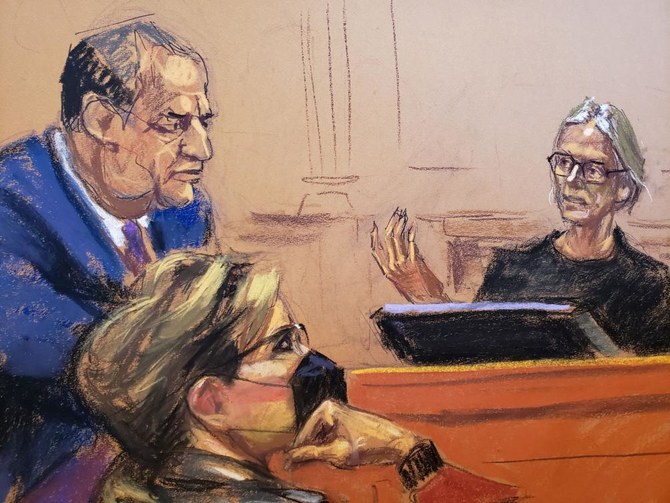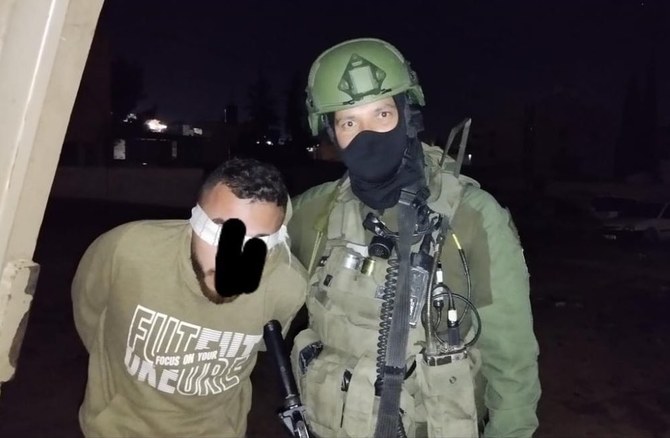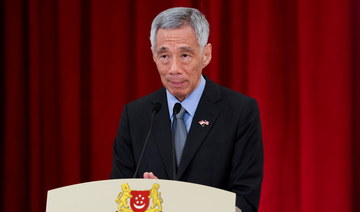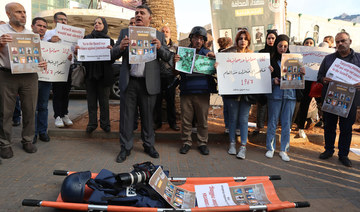NEW YORK: A former New York Times editorial page editor was put on the defensive on Tuesday in Sarah Palin’s defamation trial against the newspaper over a 2017 editorial.
The editorial incorrectly linked the former Republican vice presidential candidate and Alaska governor to an earlier mass shooting in Arizona.
James Bennet, the former editor, testified during the trial’s fourth day that he relied upon research done by colleagues before adding language to a draft editorial that suggested Palin’s political action committee might have incited the 2011 Arizona shooting.
Six people died and former US congresswoman Gabby Giffords was seriously wounded in that shooting.
The June 14, 2017, editorial about gun control and the decline of political discourse followed a shooting at a baseball practice in Virginia in which Steve Scalize, a member of the House of Representatives’ Republican leadership, was wounded.
“I was really concerned ... that something like this didn’t seem like such a big deal anymore,” Bennet told Palin’s lawyer Shane Vogt in Manhattan federal court. “It seemed like a huge deal that several Republican congressmen had been shot, and I did want to get our readers’ attention to that.”
The trial is a test of legal protections that have long safeguarded US media from defamation claims by public figures.
Palin’s lawyers have accused the Times of trying to falsely smear her, and questioned other Times journalists about the newspaper’s writing and editing procedures.
Palin, 57, has signaled that if she lost at trial she would use an appeal to challenge the landmark 1964 US Supreme Court decision in a case called New York Times v Sullivan.
She is trying to prove that Bennet and the Times acted with “actual malice,” https://www.reuters.com/article/uk-new-york-times-palin-idUKKBN25O31B a high standard adopted in the Sullivan decision, meaning they knew the editorial was false or had reckless disregard for the truth.
Bennet is the highest-level Times journalist expected to testify.
In the disputed editorial, Bennet referenced the circulation by Palin’s political action committee before the Giffords shooting of a map putting the congresswoman and 19 other Democrats under cross hairs, and wrote that “the link to political incitement was clear.”
In a subsequent correction, the Times said there was no such link. “We got an important fact wrong,” the Times wrote on Twitter.
Bennet said he added the disputed material to a draft prepared by Elizabeth Williamson, then a member of the newspaper’s editorial board. Williamson testified last week.
Bennet also said he had no independent recollection of whether he had read some background material that colleagues had sent him prior to publication that might have alerted him to the error.
“It’s so hard, Mr. Vogt, for me to tell now what I knew at the time, what I’ve learned since, and I’m sorry, I’ve kind of mixed that stuff up,” Bennet said.
Bennet has said he intended no harm to Palin, and that he thought the editorial was correct when published.
Linda Cohn, a retired Times editor, testified earlier on Tuesday that she never heard Bennet discussing Palin negatively, and that he appeared surprised to learn people were upset with the editorial’s wording.
“There was a general sense of ‘oh no,’” she said.
Palin was the Republican 2008 vice presidential nominee and served as Alaska governor from 2006 to 2009.
New York Times editor on defensive at Sarah Palin defamation trial
https://arab.news/5s38z
New York Times editor on defensive at Sarah Palin defamation trial

- James Bennet, the former editor, testified during the trial's fourth day that he relied upon research done by colleagues
- "I was really concerned ... that something like this didn't seem like such a big deal any more," Bennet told Palin's lawyer Shane Vogt in Manhattan federal court
News Corp. makes deal to let OpenAI use its content

- ChatGPT’s creator is also in the process of signing content licensing agreements with media outlets
NEW YORK: News Corp. on Wednesday announced a deal to let ChatGPT-maker OpenAI use content from its publications in artificial intelligence products.
OpenAI will get access to current and archived content from News Corp. properties including The Wall Street Journal, Barron’s, MarketWatch, and The New York Post, according to a joint release.
Financial terms of the deal were not disclosed, but the Wall Street Journal cited sources close to the company as saying it was valued at more than $250 million over five years and included credits for News Corp. using OpenAI technology.
Authors, artists, and news groups have been accusing OpenAI and its rivals in the generative artificial intelligence market of using copyrighted content for training models without asking permission or paying.
Generative AI models are trained on mountains of data in the effort to get software to think the way people do.
“This landmark accord is not an end, but the beginning of a beautiful friendship in which we are jointly committed to creating and delivering insight and integrity instantaneously,” News Corp. chief executive Robert Thomson said.
OpenAI gets permission to display News Corp. content in response to queries by users of its technology, according to terms of the deal.
“Our partnership with News Corp. is a proud moment for journalism and technology,” Open AI CEO Sam Altman said in the release.
“Together, we are setting the foundation for a future where AI deeply respects, enhances, and upholds the standards of world-class journalism.”
ChatGPT’s creator is also in the process of signing content licensing agreements with media outlets — including the Associated Press, Germany’s Axel Springer Group (publisher of tabloid Bild), French daily Le Monde and Spanish conglomerate Prisa Media — to enrich its models.
The announcement of the agreement with News Corp. comes on the heels of a new controversy, after actress Scarlett Johansson accused OpenAI of copying her voice for a new voice assistant without her permission.
Altman has apologized and announced the suspension of the voice, called “Sky.”
Antisemitism group posts fake news about politician after Ireland recognizes Palestinian state

- Stop Antisemitism puts message on X claiming Irish Foreign Minister Micheal Martin’s daughter was kidnapped and raped in Gaza on Oct. 7; later admits this ‘did not actually occur’
- Blatant disinformation outrages users; some suggest such posts only provoke antisemitism, others say comments about rape should not be made lightly
DUBAI: US-based organization Stop Antisemitism posted a message on social media platform X on Wednesday that appeared to state Irish Foreign Minister Micheal Martin’s daughter, Aoibhe Martin, had been kidnapped and raped by Hamas in Gaza on Oct. 7 and that now “he is rewarding his daughter’s rapists with a state of their own.”
The organization added another post, more than an hour later, in which it said the initial post “is for illustrative purposes only” and the events it described “did not actually occur.”
Meet Ireland's FM Micheal Martin family - on October 7th, Hamas terrorists raped & kidnapped his daughter Aoibhe Martin into Gaza.
— StopAntisemitism (@StopAntisemites) May 22, 2024
Today FM Micheal Martin announced he is rewarding his daughter's rapists with a state of their own.
LUNACY RIGHT?! Then why are you doing this to… pic.twitter.com/UZVnAV6W1e
The blatant use of disinformation outraged many X users, with some suggesting that such posts serve only to increase incidents of antisemitism. Others said comments about rape should not be made lightly and that there was nothing “illustrative” about the post.
Tweets like this actually increase antisemitism rather than stopping it
— Pericles 'Perry' Abbasi (@ElectionLegal) May 22, 2024
It's not very illustrative. Respectfully, you should really take this post down.
— Patrick Pendergast (@LPoPNH) May 22, 2024
Why are you lying about a woman being raped? This is extremely weird behaviour and does nothing to help stop antisemitism.
— Cillian (@CilComLFC) May 22, 2024
Does not make sense.
— DeepState Illuminate (@TheDeep_State6) May 22, 2024
If this is a hypothetical that isn't clear. And it's really tasteless. Trivializes the actual victims.
— Eve Examines(@EveExamines) May 22, 2024
This does not deliver on the sentiment that is being attempted.
— Su-Lai-Mahn (@sulaimankhn6) May 22, 2024
This actually shows the brazen disregard for such allegations, if they are thrown around to make a point this it completely misses to make.
Critics say that disinformation and fake news has greatly increased on X since Elon Musk bought the platform in April 2022. In the past two years, the company has shed thousands of jobs, many of them related to content moderation.
European Commission Vice President Vera Jourova last year accused X of being the social media platform with the highest ratio of fake news, and urged Musk to comply with EU laws designed to combat disinformation.
In April, X’s own artificial intelligence chatbot Grok generated a fake headline that stated: “Iran Strikes Tel Aviv with Heavy Missiles.” It was promoted on the main X feed.
In the 48 hours following the Oct. 7 attacks by Hamas on Israel, misinformation was rampant on the platform. One video that claimed to show Israeli generals captured by a Hamas fighter was actually footage of separatists detained in Azerbaijan. Another clip showing an airplane being shot down was accompanied by the hashtag #PalestineUnderAttack when it was really footage taken from the video game Arma 3. The former video was viewed more than 1.7 million times in two days, the latter more than 500,000 times.
Earlier on Wednesday, Martin had announced in a video message posted on X that the Irish government will formally recognize the State of Palestine on May 28.
“The Palestinian people’s right to self-determination, peace, dignity and statehood must be vindicated,” he added. “It is our conviction that the two-state solution remains the only viable option to secure a just and lasting peace that fulfills these rights for both Israelis and Palestinians alike.”
Today, the Government announces it will formally recognise the State of Palestine on May 28th.
— Micheál Martin (@MichealMartinTD) May 22, 2024
Today, we state clearly our unambiguous support for the equal right to security, dignity, and self-determination for the Palestinian and Israeli peoples. pic.twitter.com/uGoymhg5VD
He added that recognition of Palestine as a state did not mean the legitimization of Hamas.
“Recognition does not involve recognition of a government, it’s recognition of a state,” he told Irish radio program The Pat Kenny Show.
Martin had not responded to Stop Antisemitism’s post on X at the time of writing.
Spotify spotlights Khaleeji music in New York’s Times Square

- Saudi artist Sultan Al-Murshed and Iraqi artist Aseel Hameem have been selected as Spotify’s RADAR Arabia and EQUAL Arabia artists for May
DUBAI: Spotify is spotlighting Saudi artist Sultan Al-Murshed and Iraqi artist Aseel Hameem, who have been selected as Spotify’s RADAR Arabia and EQUAL Arabia artists for May, in New York’s Times Square.
“We continue to be committed to showcasing and celebrating genres and creators reflecting different spectrums of Arabic music,” said Nada Elmeri, Spotify’s Artist and Label Partnerships Manager for the Gulf Region at Spotify MENA.
This month was dedicated to celebrating Khaleeji Pop — a genre “that has played a pivotal role in our childhood memories yet continues to resonate with young listeners and is met with a lot of loyalty from fans across different generations,” Elmeri told Arab News.
Al-Murshed, a rising star from Saudi Arabia, was selected as this month’s RADAR Arabia artist for winning listeners over with his melodies and vocals.
His debut single “Wala Ghaltah,” released in 2022, has amassed over 1 million streams on Spotify. Over the last month or so, his streams have increased by 73 percent and fans have saved his music 97 percent more over the same period.
He also worked with renowned DJ and producer R3HAB and Big Bo in 2022 for the official Gamers8 anthem, “Challenge.”
This month’s EQUAL Arabia artist is Aseel Hameem, daughter of renowned Iraqi musician Kareem Hameem, who began her musical journey when she was a young girl. Her talent was evident quickly garnering her the nickname “The Guitar of Iraq.”
Despite her Iraqi roots, Hameem has mastered singing in the Saudi and Khaleeji dialects, gaining substantial support in Saudi Arabia. Her most popular hits include “Shkad Helw” and “Al Mafrod” with the latter garnering over 14 million streams on Spotify.
Her latest release, “Mostafz Alnas,” has resonated with audiences in Saudi Arabia, Egypt, Iraq, Germany, and the US, Spotify said.
Throughout May, Spotify is running a promotional campaign to boost Hameem’s work including editorial placements and social media support.
Both Al-Murshed and Hameem were featured on a billboard in New York City’s Times Square as well as on the covers of the RADAR Arabia and EQUAL Arabia playlists on Spotify this month.
“To spotlight the (Khaleeji Pop) genre in an impactful way, we featured two Khaleeji artists across different career journeys,” said Elmeri.
Al-Murshed “represents the new wave of the genre” while Hameem “has been a force over the years with her presence visible on our Saudi Wrapped lists,” she added.
RADAR Arabia and EQUAL Arabia are Spotify’s global music programs aimed at supporting emerging artists and female artists respectively.
Advocacy groups make fresh appeal to ICJ to allow international media access to Gaza

- Foreign journalists have been prevented from entering Gaza since beginning of the conflict, except under Israeli army supervision
- Group of nine signatories issued statement in support of South Africa’s request arguing ban could hamper future accountability
LONDON: Media advocacy groups have made a fresh appeal to the International Court of Justice to allow unimpeded media access to Gaza.
The request, signed by the Committee to Protect Journalists, Reporters Without Borders, ARTICLE 19, the Tahrir Institute for Middle East Policy, and five other media advocacy groups, was made following South Africa’s demand for the court to order Israel to facilitate access for international journalists to the Gaza Strip.
“Despite the valiant efforts of Palestinian journalists who continue reporting despite a daily struggle to survive, Israel’s censorious actions make it nearly impossible to comprehensively, continuously and independently document what is happening on the ground in Gaza and risk significantly hampering future accountability efforts,” the signatories said in a statement issued in support of South Africa’s demand.
The statement noted that journalists, independent human rights investigators, fact-finding missions, and the International Criminal Court still do not have access to Gaza, prohibiting the effective preservation and retention of evidence of potential war crimes.
The signatories highlighted recent media suppression by Israeli authorities towards Al Jazeera in May and the Associated Press this week, coupled with the conditions under which local journalists operate, making unrestricted media access to the Gaza Strip ever more “urgent and vital.”
CPJ Director of Advocacy and Communications Gypsy Guillen Kaiser said in a statement: “Any censorship of developments in Gaza creates an information void ripe for propaganda and mis- and disinformation that has consequences for public accountability and people’s lives.”
Since the beginning of the conflict, Israeli authorities have implemented a near-total ban on foreign media entering Gaza.
Despite repeated appeals, only a few exceptions have been made for certain networks and journalists, and even then, only under the direct supervision of the Israeli military.
Experts argue that this approach has forced international media to rely heavily on overburdened Palestinian journalists and risk significantly hampering future accountability efforts.
“Journalists have historically played a critical role in contemporaneously investigating and preserving the evidence of war crimes in genocides and other atrocities,” read the letter, adding that in January, the ICJ issued an order to Israel requesting authorities to “take effective measures to prevent the destruction and ensure the preservation of evidence related to allegations of acts.
“Israel’s continuing assault on journalists, freedom of expression and people’s right to access information violates international human rights and humanitarian law,” added ARTICLE 19 Senior Director for Law and Policy Barbora Bukovska.
“It defies the ICJ’s January order for evidence to be preserved as the conflict continues and will hinder accountability efforts. It is therefore vital that the ICJ is crystal clear this time around that Israel’s actions must stop.”
Israeli mayor posts photos of himself with blindfolded Palestinian detainees

- Shimon Tobol took the photos during his time as a reservist in the West Bank
- News follows BBC analysis of Palestinian prisoners being abused by Israeli soldiers on social media
LONDON: The deputy mayor of Be’er Sheva in southern Israel has posted a series of photographs on Facebook showing himself with handcuffed and blindfolded Palestinian detainees.
The images were taken while Shimon Tobol was doing military service in the occupied West Bank from Oct. 7 until the end of January this year. They have been published on his personal account over the course of several months.
Tobol, who heads the local faction of the national-social party Gesher, has served as one of the deputies to Be’er Sheva Mayor Rubik Danilovich for the past two and a half years, according to Israeli newspaper Haaretz which first published the news.
His Facebook account is filled with footage humiliating the Palestinian detainees, accompanied by mocking captions.
In one post, an image of a blindfolded bearded man crouching on the floor is captioned: “They say the bigger the beard, the higher the rank. This time, he had a really big beard. No apologies, no mercy, no stopping. We have started speaking fluent Arabic.”
Another photo, in which Tobol is pictured next to one of the detainees, features the caption: “When the customer asks to take a selfie. A nation of cowards. The nation of Israel lives.”
Other examples include Tobol leading prisoners and describing Palestinians as Nazis, framing events as acts of revenge for the Holocaust.
“The people of Israel live. Every Nazi knew that his day would come. Our father, our king, avenge before our eyes the spilled blood of your servants,” he wrote.
Tobol’s personal profile features several such posts.
The Be’er Sheva municipality did not comment on the images but told Haaretz: “Tobol’s actions were not done as part of his work at the municipality.”
An Israeli military spokesperson said the army prohibited photography of detainees for security reasons and that such behavior was “not in line with IDF values.”
Tobol is one of many Israeli soldiers who have posted footage of themselves abusing Palestinian detainees.
A BBC analysis last week revealed Israeli soldiers were continuing to post videos of abuse against Palestinian detainees despite a military pledge that action would be taken against the perpetrators.
The analysis identified at least 45 photos and videos showing Palestinian prisoners being abused and humiliated.
Experts said the footage could breach international law and amount to war crimes.


















